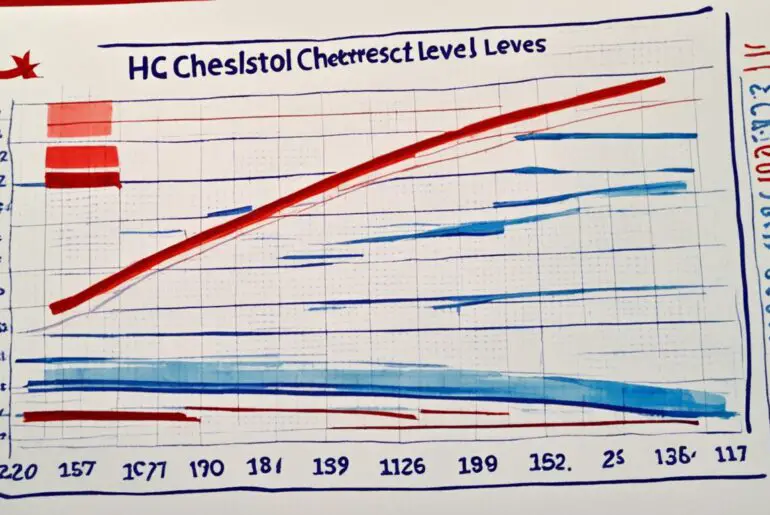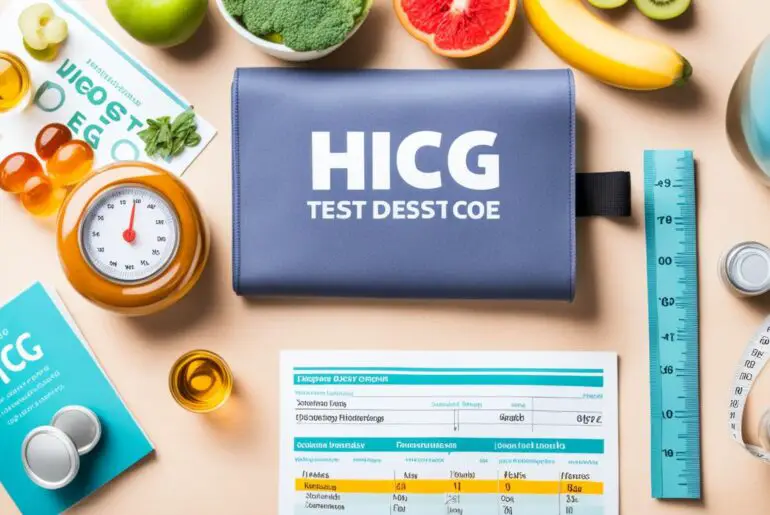Are you considering the HCG diet for weight loss? Before you take the plunge, it’s crucial to understand the potential side effects and risks, especially for women. While proponents of the HCG diet claim it can lead to rapid weight loss, many experts warn against its use due to safety concerns. So, what are the HCG diet side effects for women? Are the risks worth the potential benefits?
In this article, I will delve into the truth about the HCG diet, its safety and effectiveness, the role of HCG in weight loss, the dangers of unregulated HCG diet products, the extreme nature of the diet, and potential side effects. By the end, you’ll have a clear understanding of the risks involved and safer alternatives for achieving your weight loss goals.
Key Takeaways:
- The FDA does not recommend using the HCG diet for weight loss due to safety concerns.
- The HCG diet involves severe calorie restriction, which can lead to various side effects and health risks.
- The HCG hormone has not been proven to contribute significantly to weight loss.
- Many HCG diet products on the market are unregulated and may contain dangerous ingredients.
- There are safer alternatives for weight loss, such as following a balanced diet and engaging in regular exercise.
The Truth About HCG Diet Safety and Effectiveness
The HCG diet has been widely promoted as a solution for quick and easy weight loss. However, it is important to understand the truth behind its safety and effectiveness.
The FDA, a regulatory authority in the United States, has clearly stated that HCG medications are not proven to be effective for weight loss and has issued warnings against the use of over-the-counter HCG weight-loss products. This means that the HCG diet may not provide the desired results and can pose potential risks to your health.
One of the main concerns with the HCG diet is the severe calorie restriction it entails. The diet typically recommends consuming just 500 to 800 calories per day, which is significantly below the average daily calorie requirement for most individuals. This extreme calorie restriction can lead to various side effects and health risks.
Some of the risks associated with the HCG diet include:
- Gallstone formation
- Irregular heartbeat
- Vitamin and mineral deficiencies
- Electrolyte imbalance
- Fatigue
- Irritability
- Restlessness
- Depression
- Fluid buildup
- Swelling of the breasts in males
- Risk of blood clots forming and blocking blood vessels
These side effects and health risks highlight the potential dangers of the HCG diet. It is crucial to prioritize your well-being and consult a healthcare provider before considering any weight loss program.
“The HCG diet has not been proven to be safe or effective for weight loss. Severe calorie restriction and potential health risks make it important to explore safer alternatives.”
In conclusion, it is important to recognize the truth about HCG diet safety and effectiveness. The severe calorie restriction and potential risks associated with the diet should serve as a warning against its use. Instead of resorting to extreme measures, it is advisable to explore safer and more sustainable alternatives for achieving weight loss goals.
| Side Effects of the HCG Diet | Health Risks of the HCG Diet |
|---|---|
| Gallstone formation | Irregular heartbeat |
| Vitamin and mineral deficiencies | Electrolyte imbalance |
| Fatigue | Irritability |
| Restlessness | Depression |
| Fluid buildup | Swelling of the breasts in males |
| Risk of blood clots forming and blocking blood vessels |
Quote:
“The HCG diet has not been proven to be safe or effective for weight loss. Severe calorie restriction and potential health risks make it important to explore safer alternatives.”
The Myth of HCG’s Role in Weight Loss
The hCG hormone, commonly used in the HCG diet, is often touted as a key factor in weight loss. However, numerous studies have shown that the weight loss experienced on the HCG diet is primarily a result of the extreme calorie restriction, rather than the hormone itself. Contrary to popular belief, the hCG hormone has not been proven to significantly reduce hunger or prevent muscle loss.
Proponents of the HCG diet claim that the hormone acts as an appetite suppressant, making it easier to adhere to the low-calorie meal plan. However, scientific evidence does not support this claim. Hunger is primarily influenced by the reduced calorie intake, rather than the presence of hCG hormone in the body. Therefore, it is the drastic calorie restriction that leads to feelings of hunger.
Another misconception surrounding the HCG diet is its supposed ability to prevent muscle loss during weight loss. Unfortunately, this is not the case. The low-calorie intake on the HCG diet can actually result in muscle loss. When the body is not provided with sufficient calories, it turns to breaking down muscle tissue for energy, leading to a decrease in muscle mass.
Moreover, there is little evidence to suggest that the hCG hormone increases metabolic rate or facilitates fat burning. Weight loss on the HCG diet can be attributed to the overall calorie deficit rather than any specific effect of the hormone.
It is essential to recognize that low-calorie diets, such as the HCG diet, are not sustainable for long-term weight loss. While drastic calorie restriction may lead to initial weight loss, it is challenging to maintain such restrictive eating patterns in the long run. Moreover, the lack of essential nutrients provided by the HCG diet can be detrimental to overall health.
The role of hCG hormone in weight loss on the HCG diet is often misrepresented. It is important to focus on sustainable and healthy weight loss strategies rather than relying on extreme calorie restriction and unproven hormone-based diets.
The Dangers of HCG Diet Products on the Market

When it comes to HCG diet products available on the market, it is crucial to exercise caution. Many of these products, especially those labeled as homeopathic or sold online, are not regulated by the proper authorities. As a result, they may contain unknown and potentially dangerous ingredients that can pose serious risks to your health.
The Food and Drug Administration (FDA) has expressed concerns about the safety of these HCG diet products and has issued warnings against their use. It is important to note that homeopathic HCG products do not contain actual HCG and are therefore not effective for weight loss. Using these products can lead to adverse side effects and health complications.
Some of the potential dangers associated with HCG diet products include:
- Headaches: Taking HCG diet products can increase the risk of experiencing frequent and severe headaches, which can impact your daily life and well-being.
- Depression: Certain ingredients found in HCG diet products may contribute to feelings of sadness, hopelessness, and overall depression.
- Fatigue: HCG diet products can cause extreme fatigue, leaving you feeling exhausted and drained throughout the day.
- Increased risk of blood clots: Using HCG diet products that are not properly regulated can elevate your risk of developing blood clots, which can have serious and life-threatening consequences.
It is essential to prioritize your safety and well-being by avoiding HCG diet products that are not prescribed by a healthcare professional. Always consult with a qualified medical expert who can provide guidance on safe and effective weight loss strategies tailored to your individual needs and health status.
The Extreme Nature of the HCG Diet
The HCG diet is characterized by its extreme calorie restriction, which can have significant impacts on the body. The diet typically consists of three phases: the loading phase, the weight loss phase, and the maintenance phase.
During the weight loss phase, individuals are advised to consume only around 500 calories per day. This level of calorie restriction is considered extreme and can lead to various consequences.
The severe calorie restriction of the HCG diet can result in nutrient deficiencies as the body does not receive an adequate amount of essential vitamins and minerals. This can have a negative impact on overall health and well-being.
Additionally, the low-calorie intake can cause muscle loss, as the body may break down muscle tissue for energy. This can lead to a decrease in metabolism and ultimately hinder weight loss goals in the long term.
Furthermore, the extreme calorie restriction can increase hunger levels, making it challenging to adhere to the diet and potentially leading to overeating once the diet is completed.
The HCG diet also requires specific meal plans that include lean protein, vegetables, bread, and fruit while excluding butter, oils, and sugar. While these guidelines may promote some weight loss initially, they do not provide a well-rounded and balanced approach to nutrition.
It is crucial to understand that the extreme nature of the HCG diet is not a sustainable or healthy approach to weight loss. The severe calorie restriction and limited food choices can have adverse effects on the body and overall well-being. It is essential to prioritize nutritional balance, safe calorie reduction, and sustainable lifestyle changes for effective and long-term weight loss.
Potential Side Effects of the HCG Diet

The HCG diet is known for its extreme calorie restriction, which can have various side effects on the body. It’s important to be aware of these potential side effects before considering the HCG diet.
Headaches
Headaches are a common side effect of the HCG diet. This may be due to the severe calorie restriction and potential dehydration that can occur while following this diet plan.
Depression
Some individuals may experience feelings of depression while on the HCG diet. This could be due to the low calorie intake and potential nutrient deficiencies, which can impact mood and overall mental well-being.
Fatigue
Feeling tired and fatigued is another common side effect of the HCG diet. The body may not be receiving enough calories and nutrients to maintain sufficient energy levels, leading to overall fatigue and weakness.
Increased Risk of Blood Clots
There is an increased risk of blood clots associated with the HCG diet. This could be due to the combination of low calorie intake, dehydration, and potential electrolyte imbalances that can occur while following this diet plan.
Along with these side effects, there are other reported effects that individuals have experienced while on the HCG diet. These include irritability, restlessness, fluid buildup, swelling of the breasts in males, weakness, nausea, constipation, low blood sugar, bad breath, diarrhea, dizziness, hair loss, and muscle loss.
It is important to consult with a healthcare professional before considering the HCG diet to understand the potential risks and side effects associated with this extreme weight loss program.
Safer Alternatives for Weight Loss
If weight loss is the goal, there are safer and more sustainable ways to achieve it. Instead of resorting to extreme and potentially harmful weight loss strategies like the HCG diet, consider adopting healthy weight loss strategies that prioritize your long-term well-being. Here are some effective approaches:
1. Follow a Balanced Diet
Achieving and maintaining a healthy weight involves nourishing your body with a balanced diet that provides all the necessary nutrients. Focus on consuming a variety of fruits, vegetables, whole grains, lean proteins, and healthy fats. Limit your intake of processed and sugary foods, as they can contribute to weight gain and negatively impact your overall health.
2. Engage in Regular Exercise
Physical activity plays a crucial role in weight loss and overall health improvement. Incorporate regular exercise into your routine to boost your metabolism, burn calories, and increase muscle mass. Aim for a combination of cardiovascular exercises, such as brisk walking or cycling, and strength training exercises to build lean muscle and increase your body’s fat-burning potential.
3. Manage Portion Sizes
Controlling portion sizes is essential for successful weight loss. Pay attention to your hunger and fullness cues and avoid overeating. Consider using smaller plates and bowls to help control your portions visually. Additionally, practice mindful eating by savoring each bite, chewing slowly, and being aware of the flavors and textures of your food.
4. Make Lifestyle Changes
Weight loss is not only about what you eat but also about the lifestyle choices you make. Incorporate healthy habits into your daily routine, such as getting enough sleep, managing stress, staying hydrated, and avoiding excessive alcohol consumption. These lifestyle changes can support your weight loss journey and promote overall well-being.
By following these safer alternatives, you can achieve long-term weight loss and improve your overall health without compromising your well-being. It is always recommended to consult with a healthcare provider or a registered dietitian to develop a personalized weight loss plan that suits your individual needs and ensures your safety throughout the process.
The Importance of Consulting a Healthcare Provider

Before embarking on any weight loss program, including the HCG diet, it is crucial to consult with a healthcare provider for personalized guidance. Your healthcare provider will be able to assess your individual health status and evaluate the potential risks associated with a specific weight loss strategy, such as the HCG diet. They can provide expert advice on safe and effective ways to achieve your weight loss goals while prioritizing your overall health and well-being.
Consulting a healthcare provider is particularly important when considering the HCG diet due to the potential health risks associated with this extreme weight loss approach. Your healthcare provider can help you understand the potential side effects and complications that may arise from severe calorie restriction and the use of unregulated HCG products.
Additionally, a healthcare provider can develop a personalized weight loss plan that takes into account your unique circumstances. They will consider factors such as your pre-existing conditions, medications, and specific dietary needs. Having a tailored weight loss plan ensures that you are making informed choices that align with your overall health goals.
By consulting a healthcare provider, you can gain professional insight and guidance that will help you make educated decisions about your weight loss journey. They will support you in implementing safe and sustainable strategies, assisting you in achieving long-term success while minimizing potential health risks.
Benefits of Consulting a Healthcare Provider:
- Assessment of your individual health status
- Evaluation of potential risks associated with the HCG diet
- Guidance on safe and effective weight loss strategies
- Development of a personalized weight loss plan
- Management of pre-existing conditions and medications
- Support in achieving long-term weight loss goals
“Consulting a healthcare provider before starting any weight loss program ensures that you receive expert guidance tailored to your specific needs and health considerations.”
| Health Benefits of Consulting a Healthcare Provider | Why It Matters for Weight Loss |
|---|---|
| Personalized Evaluation | Ensures a thorough assessment of your health status and the identification of potential risk factors. |
| Informed Decision-making | Enables you to make educated decisions about weight loss strategies, balancing potential benefits and risks. |
| Safety First | Minimizes potential health risks by providing guidance on safe and effective weight loss approaches. |
| Individualized Weight Loss Plan | Helps develop a customized weight loss plan that takes into account your unique health needs, conditions, and medications. |
| Long-term Success | Supports you in achieving sustainable weight loss goals while prioritizing your overall health and well-being. |
No weight loss journey should be embarked upon without the guidance of a qualified healthcare provider. They possess the knowledge and expertise necessary to navigate the complex landscape of weight loss strategies and can help you make informed choices that promote your well-being.
Conclusion
After careful examination of the HCG diet, it is clear that this weight loss method is not recommended due to the lack of proven safety and effectiveness. The severe calorie restriction involved in the HCG diet can lead to various side effects and health risks, including gallstone formation, irregular heartbeat, and nutrient deficiencies.
Furthermore, the use of unregulated HCG products can be dangerous, as they may contain unknown and potentially harmful ingredients. It is crucial to prioritize long-term health and adopt safer alternatives for weight loss.
A balanced diet, regular exercise, and consultation with a healthcare provider are indispensable for sustainable weight loss. By following these methods, individuals can achieve their weight loss goals while ensuring their overall well-being.
FAQ
What are the side effects of the HCG diet for women?
The side effects of the HCG diet for women can include gallstone formation, irregular heartbeat, limited intake of vitamins and minerals, electrolyte imbalance, fatigue, irritability, restlessness, depression, fluid buildup, swelling of the breasts in boys and men, and the risk of blood clots forming and blocking blood vessels.
Is the HCG diet safe for weight loss?
The HCG diet has not been proven to be safe or effective for weight loss. The Food and Drug Administration (FDA) has advised against using over-the-counter HCG weight-loss products, as they are not approved for safe and effective use.
What is the role of the HCG hormone in weight loss?
The hCG hormone used in the HCG diet has not been proven to contribute to weight loss. Multiple studies have shown that weight loss on the HCG diet is primarily due to the drastic calorie restriction, rather than the hormone itself.
Are HCG diet products on the market safe?
Many HCG diet products available on the market, particularly those labeled as homeopathic or sold online, are not regulated and may contain unknown and potentially dangerous ingredients. The FDA has questioned the safety of these products and has warned against their use.
How extreme is the HCG diet?
The HCG diet is an extremely low-calorie diet that typically consists of three phases: loading phase, weight loss phase, and maintenance phase. During the weight loss phase, calorie intake is severely restricted to around 500 calories per day.
What are the potential side effects of the HCG diet?
Potential side effects of the HCG diet can include headaches, depression, fatigue, increased risk of blood clots, irritability, restlessness, fluid buildup, swelling of the breasts in males, weakness, nausea, constipation, dehydration, low blood sugar, bad breath, diarrhea, dizziness, hair loss, and muscle loss.
What are some safer alternatives for weight loss?
Safer alternatives for weight loss include following a balanced diet that provides adequate nutrition, engaging in regular exercise, managing portion sizes, and making lifestyle changes. These approaches promote long-term weight loss and overall health improvement.
Why is it important to consult a healthcare provider before starting the HCG diet?
It is important to consult with a healthcare provider before starting any weight loss program, including the HCG diet. They can assess your individual health status, evaluate the potential risks, and provide guidance on safe and effective ways to achieve your weight loss goals.
Is the HCG diet recommended for weight loss?
The HCG diet is not recommended for weight loss due to its lack of proven safety and effectiveness. Severe calorie restriction and the use of unregulated HCG products can lead to various side effects and health risks.




